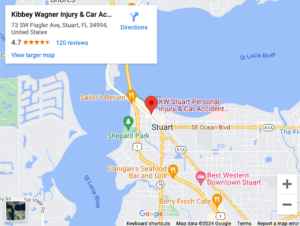
A statute of limitations sets deadlines for filing lawsuits for personal injuries and wrongful deaths. If you do not file a lawsuit before the statute of limitations expires, the court can dismiss your lawsuit based on that fact alone.
Regardless of the deadline for filing a lawsuit, it is in your best interest to talk to an experienced Stuart personal injury lawyer to learn about your options. Prompt legal counsel can help improve your chance of receiving the compensation you deserve after an accident or injury.
Florida Statute of Limitations for Personal Injury Cases

Florida Statute §95.11 is the state’s statute of limitations and sets the deadline for filing most personal injury claims. While there are exceptions, claims based on negligence have a two-year statute of limitations.
Examples of negligence claims that are subject to the two-year statute of limitations include:
- Slip and fall accidents
- Car accidents
- Product liability claims
- Motorcycle accidents
- Boating accidents
- Large truck accidents
- Construction accidents
- Bicycle accidents
- Rideshare accidents, including Lyft and Uber
- Pedestrian accidents
- Premises liability claims
- Construction accidents
This list does not include all types of personal injury cases subject to the two-year statute of limitations. Also, some exceptions could lengthen or shorten the deadline for filing your claim. If you need to know how long you have to file a lawsuit, call our Stuart personal injury law firm and speak with a lawyer.
Florida Medical Malpractice Statute of Limitations
Medical malpractice lawsuits hold doctors, hospitals, and other medical providers liable for damages caused by medical errors and negligence. Because an injury caused by medical malpractice might not be immediately known, the statute of limitations for these cases differs.
The deadline for filing most medical malpractice lawsuits in Florida is two years from the malpractice date. However, there are exceptions if you did not know about the injury.
If you did not know about the injury immediately, the statute of limitations could be extended. However, you have just two years to file the claim once you discover the malpractice.
When medical malpractice involves fraud, misrepresentation, or concealment, you have two years from when you discover the malpractice to file a claim. However, there is a strict seven-year deadline for filing a claim under these circumstances.
A similar exception exists for children under eight years old. A parent can file a medical malpractice claim within two years of discovering the malpractice until the child’s eighth birthday.
Florida Wrongful Death Statute of Limitations
A wrongful death occurs when someone causes another person’s death through negligence, intentional torts, or other wrongdoing. The family can file a wrongful death claim seeking damages within two years of the person’s date of death. However, the deadline might not be the same as the date of injury if the person survived for a period after the accident that caused their death.
Deadlines for Filing Claims for a Workplace Injury
Most workers in Florida are covered by workers’ compensation insurance. You must report injuries to your employer within 30 days to receive benefits. Other rules apply for filing claims and lawsuits based on state workers’ comp laws.
A third party’s negligence causes some workplace accidents. For example, a defective product or unsafe property conditions could cause the worker’s injury. If so, the worker might have a personal injury claim against the third party.
Third-party claims for workplace accidents would have the same statute of limitations as other personal injury cases. Therefore, unless an exception applies, most cases would have a two-year deadline.
Personal Injury Lawsuits Against the Government in Florida
In most cases, governments are protected from civil lawsuits. However, Florida has waived the protection to allow lawsuits claiming negligence. However, the rules for suing the state or other government entities are different.
You must file a notice of claim with the Department of Financial Services within three years of the injury date. Wrongful death claims have a two-year filing deadline. If the claim is denied, the person will file a lawsuit in the appropriate court within the three-year (or two years for wrongful death) deadline.
Tolling of the Statute of Limitations for Florida Personal Injury Cases
In some situations, the statute of limitations for a personal injury case can be tolled or paused. State law tolls the statute of limitations in the following situations:
- The defendant left the state
- The defendant is hiding or cannot be located
- The plaintiff is mentally incapacitated before the date of injury, with a strict seven-year deadline to file after the event
- During pending arbitration proceedings for the personal injury case
Determining whether the statute of limitations is paused for a personal injury case can be complicated. Injured parties could lose their right to file a lawsuit if they assume an exception applies in their case.
Why You Should Talk With a Stuart Personal Injury Lawyer Immediately
It is always best to let a Florida personal injury lawyer determine the deadline based on the facts and circumstances of the case. Numerous factors can lengthen or shorten the time to file a claim, including but not limited to the following:
- The date of the injury or death
- When you discovered the injury or should have reasonably known about the injury
- The parties involved in the case
- The age or mental capacity of the injured party
- The type of personal injury case
If you miss the filing deadline, you cannot legally require the at-fault party to compensate you for damages.
The damages in a personal injury case can be significant. You are entitled to seek compensation for your economic damages, including lost wages, out-of-pocket expenses, medical bills, and diminished earning capacity.
You can also demand compensation for the pain and suffering caused by the accident and injury. Non-economic damages can also include diminished quality of life, permanent impairment, and disfigurement. Some lawsuits could include punitive damages if the facts of the case justify the award.
Seeking legal advice early in the process helps you avoid mistakes that could hurt your case. It also allows your attorney to investigate the case before evidence can be lost or destroyed.
Call Us for a Free Consultation With a Stuart Personal Injury Lawyer
The best way to avoid problems with the statute of limitations is to seek legal advice as soon as possible after an injury or accident. Contact Kibbey Wagner Injury & Car Accident Lawyers Stuart today for a free case evaluation at (772) 444-7000 with an experienced Stuart personal injury attorney.

